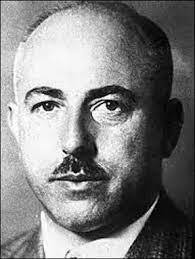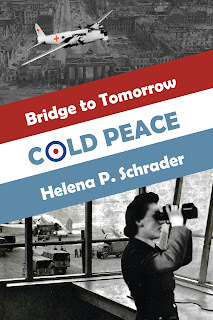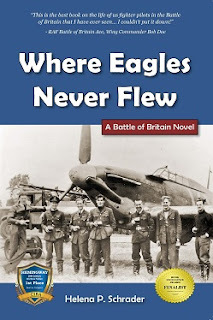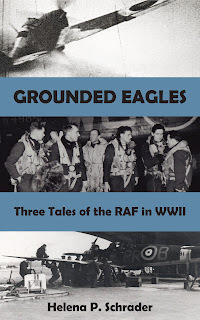BRIDGE TO TOMORROW: COLD PEACE -- MEET JAKOB LIEBHERR
Jakob Liebherr isn't young any more. In fact, he's losing his hair and two years in a concentration camp have left his internal organs damaged in a variety of ways. But his determination to make Germany a better place is unbroken. He can see the dangers bright as day -- just as he saw the danger Hitler posed 1930 - 1933. He knows the enemy is in the East, disguised as "Socialist solidarity" and "brotherhood of the working classes." But as the Russian bear licks his chops and prepares to devour Berlin, Jakob begins to despair about the willingness of the West to stand up to him.

Excerpt 1:
Herhusband sighed and then admitted in a small voice, “I’m frightened, Trude.”
Trudesank into the chair her son had vacated. She reached across the table and tookher husband’s hands in hers. Through two world wars, a revolution, andincarceration in a concentration camp, she had never heard her husband admit hewas afraid. Gently she probed, “What frightens you, Jakob?”
“Thewhole situation. I always thought that if we could just get rid of the Nazis,we could rebuild, start anew. I thought we could draft a new social democraticconstitution and write new laws…. But look at us! Two and a half years afterthe end of the war, the country is not only still occupied, it is sinkingdeeper and deeper into poverty. The currency is worthless. The black-marketflourishes, enriching only the dishonest. Honest people have nothing left tosell — except their bodies. And while the Soviets rob us of everything — ourfood, our industrial capacity, our children, our hope — the Western allies senddiplomatic notes of protest! They still view us — rather than the Soviets — astheir enemies. I had such hopes when they first arrived. I thought they wouldprotect us from the Red Army and the NKVD. I thought they would support our aspirationsfor democracy. Instead, they let the Russians lead them around by thenose.”
Trudenodded sadly. She had no words of comfort. She felt as discouraged as herhusband.
“ErnstReuter was elected mayor last June.” Her husband reminded her, “The SovietMilitary Administration vetoed his right to take office in July and it is nowDecember, yet nothing — absolutely nothing — has been undertaken to enable himto govern. Instead, the Soviet-appointed police commissioners grow bolder andSoviet-appointed officials usurp the power of the elected government withimpunity.”
“TheAllied Foreign Ministers are meeting in London,” Trude reminded him, graspingat straws. “The American Secretary of State, General George Marshall, is not asnaïve as his predecessors. Maybe things will start to change.”
Jakobdidn’t believe that but he knew Trude was trying to cheer him up. Besides,there wasn’t any other straw to cling to, so he forced a smile and muttered,“Let’s hope so.”
Jakob Liebherr represents the stalwarts of the Social Democratic Party of Germany, the SPD, who opposed Hitler before he came to power and continued to oppose him after he seized power. The SPD that was the sole party to vote against Hitler's enabling law, and many leaders and members of the SPD were arrested, sent to concentration camps or executed for treason. Their ranks includes such giants as Julius Leber and William Leuschner (who is pictured above as my prototype for Jakob Liebherr) and secondary figures who escaped death by going into exile -- and lived to rise to positions of prominence in the Federal Republic of Germany. Men such as Willy Brandt and Ernst Reuter.
Although Jakob Liebherr is a fictional character, he is modeled after Leber and Leuschner and his wife Trude, herself an active member of the SPD, is a reminder that women played an important role in German Social Democracy in this period. Jakob comes from a working-class background. He has worked his way up through the ranks of the party, serving in local and municipal governments, until in 1928 he stands for a parliamentary seat and wins. He is still a member of the Reichstag in 1933, when Hitler introduces his "Enabling Law" that effectively dismantled the democratic constitution and replaced it with an racist, authoritarian dictatorship. Liebherr proudly votes with his colleagues against the law. Within months, the Nazis have arrested him without due cause and send him to a concentration camp without due process. He is there for two years. On his release, although he keeps a low profile, he continues to maintain contact with like-minded men and is actively involved in helping opponents of the regime obtain false documents, food, clothes and hiding places. Too old to be conscripted into the armed forces, he survives the war in Berlin, where he witnesses at first hand both the fanaticism of Hitler's supporters in the closing days of the war and the brutality and greed of the Soviets in the first days of the peace.
By early 1948, Jakob has seen the worst of human nature and he is getting weary and discouraged, but he is not defeated. He's still fighting to save Germany, this time from the Russian threat. He does so in his capacity as an elected member of the Berlin City Government, but also at home where he is fighting the disinformation spread by the Soviets which his son Karl has swallowed blindly.
Excerpt 2:
“Youthink only capitalists commit mass murder?” Jakob Liebherr asked his son Karlincredulously.
Asusual, Karl was home for Saturday dinner, but because Trude had been delayed atthe hospital where she worked, the two men were cooking for themselves. Thisamounted to Jakob frying eggs and onions, while Karl sat at the kitchen tablenursing a bottle of local beer in a brown bottle. “Whokilled the Kulaks?” Jakob asked his son.
“Don’ttry to change the subject!” His son protested frowning.
“I’mnot changing the subject. You said only capitalism produces tyranny and massmurder. I’m simply pointing out you are wrong. Your 'Great SocialistMotherland' has also carried out the slaughter of millions of people.”
“Nothingcomparable to the death camps, Vati! How can you, a victim of the Nazis, talksuch nonsense?”
“Becauseit is true. Millions of kulaks were killed and many more millions died ofstarvation because of the forced collectivization of agriculture.”
“Thatwas nothing like what the Nazis did!” Karl insisted. “It was only because theKulaks offered resistance that they had to be eliminated. That is the keydifference that you either fail to understand or refuse to recognize,” Karlinsisted. “Fascists kill for their own benefit, for individual profit, not for the good of the working masses."
J akobswitched off the gas on the stove and with the handle of the skillet wrapped ina hot pad, carried it to the table. With a spatula, he dished half the eggsonto Karl’s waiting plate and the other half on his own. Then he returned theskillet to the stove and put salt and pepper on the table before sitting down.His son had already started scooping the eggs and onions into his mouth with anevident appetite.
Takingadvantage of his son’s mouth being full, Jakob asked, “Aside from the fact thatHitler justified the slaughter of the Jews with the exact same argument, tellme who profited from the collectivization, Karl? Livestock was slaughtered on amassive scale and the meat rotted. Agricultural productivity declined. Faminefollowed. Millions starved to death. Who profited? The masses? The peasants?”
“You’returning things on their head! The Kulaks killed the livestock and causedagricultural production to fall because they didn’t cooperate! The famine wasnot the fault of collectivization but of the profit-seeking Kulaks!”
Jakobhad not taken a bite to eat yet, but he leaned forward to speak more softly anddirectly to his son. “No one in Moscow starved, Karl. Or St. Petersburg. OrKyiv. In Moscow, they gave banquets with caviar and white bread heaped inmounds.”
“That’spropaganda!” Karl protested angrily.
“Iread it in Pravda, Karl, and so can you if you go to an archive. Pravda bragged and printed pictures of the receptions inMoscow, of Stalin at state dinners, of Molotov entertaining foreign dignitaries.At every opportunity, it claimed that the famine was Western propaganda, afabrication, a lie. Agricultural production Pravda said,had never been higher.”
Karlfrowned, recognizing too late that his father had laid a trap for him, but he doggedlyfought back. “The Kulaks were capitalists, laying claim to land — which canonly be held collectively for the common good of all people — and seeking tomake profit from the sale of agricultural produce that belongs by rights to theentire people. They had to be eliminated.”
“Why? It couldn’t have been for the benefit of the people, Karl,because the rest of the population had more food when theKulaks had farms than they have had at any time since the collectivization. Inshort, collectivization failed and failed miserably.”
“Thatis not true!”
“Itis true! It is a fact — an objective, verifiable fact and onlywilful blindless prevents you from seeing and admitting it. Until you startfacing facts, you will be living in a fantasy, following a mirage that willlead you to ever greater darkness and misery. Wake up!”
Cold Peace is Book I of the Bridge to Tomorrow Series.
Three years after WWII, Europe struggles with rationing, widespread unemployment and a growing Soviet threat. Hitler's former capital lies ruined under the joint control of wartime allies bitterly at odds. With the currency worthless, the population lives on hand-outs or turns to crime and prostitution. Deep inside the Soviet Zone of occupation, Berlin appears to be an ideal target for a communist take-over, putting the defenders of democracy on a collision course with Stalin's merciless aggression.
A Battle of Britain ace, a female air traffic controller, a concentration camp survivor and an ex-ATA woman pilot are just some of those trying to find their place in the post-war world. An air ambulance service offers a shimmer of hope, but when a Soviet fighter brings down a British passenger liner, Berlin becomes a flashpoint. The world stands poised on the brink of World War Three.

Find out more at: https://www.helenapschrader.com/bridg...
Previous releases include:
" MORAL FIBRE," which WON THE HEMINGWAY AWARD 2022 FOR 20TH CENTURY WARTIME FICTION and a MAINCREST MEDIA AWARD FOR MILITARY FICTION as well as being A FINALIST FOR THE BOOK EXCELLENCE AWARD 2023 IN THE CATEGORY HISTORICAL FICTION.
Riding the icy, moonlit sky,they took the war to Hitler.
Their chances of survival were less than fifty percent.
Their average age was 21.
This is the story of just one bomber pilot, his crew and the woman he loved.
It is intended as a tribute to them all.
or Barnes and Noble.
 "This is the best book on the life of us fighter pilots in the Battle of Britain that I have ever seen.... I couldn't put it down."-- RAF Battle of Britain ace, Wing Commander Bob Doe.
"This is the best book on the life of us fighter pilots in the Battle of Britain that I have ever seen.... I couldn't put it down."-- RAF Battle of Britain ace, Wing Commander Bob Doe.
Winner of a Hemingway Award for 20th Century Wartime Fiction, a Maincrest Media Award for Military Fiction and Silver in the Global Book Awards.
Find out more at: https://crossseaspress.com/where-eagles-never-flew
For more information about all my books visit: https://www.helenapschrader.com
 Disfiguring injuries, class prejudice and PTSD are the focus of three tales set in WWII by award-winning novelist Helena P. Schrader. Find out more at: https://crossseaspress.com/grounded-eagles
Disfiguring injuries, class prejudice and PTSD are the focus of three tales set in WWII by award-winning novelist Helena P. Schrader. Find out more at: https://crossseaspress.com/grounded-eagles




